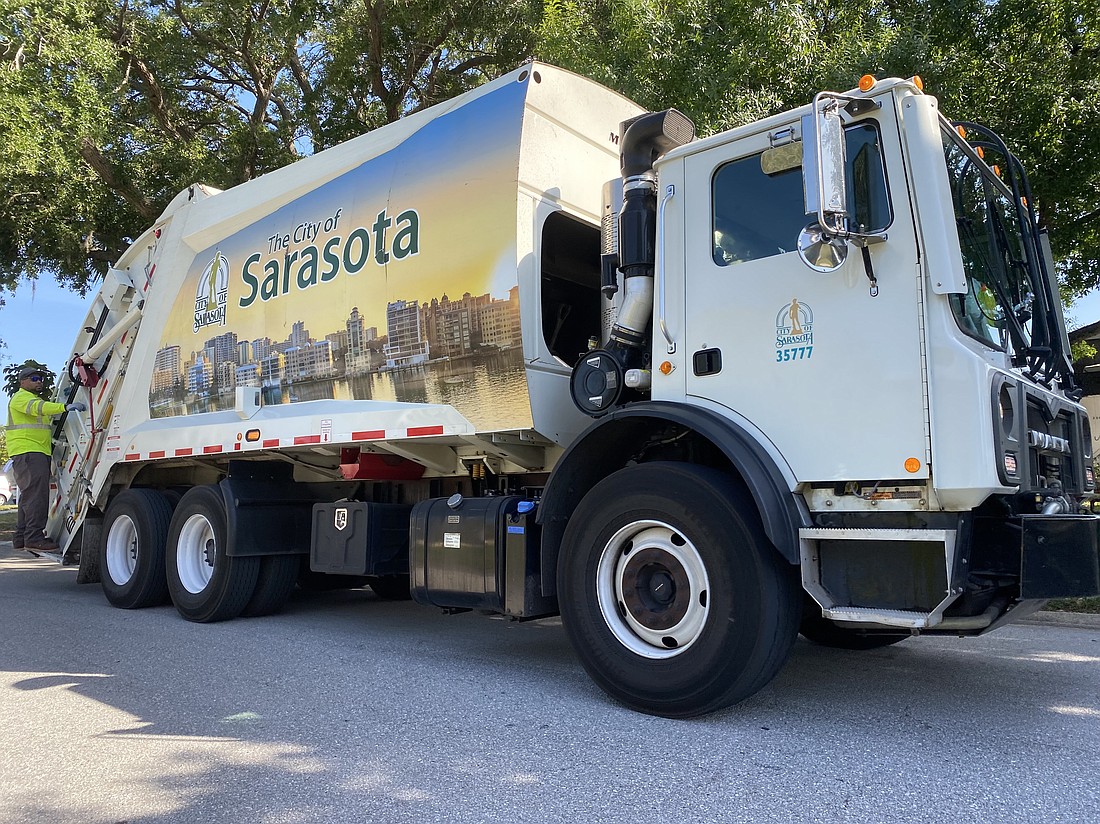- April 14, 2025
-
-
Loading

Loading

Starting next fiscal year, residential and commercial customers in Sarasota will be paying more for solid waste collection.
During the Aug. 21 meeting of the Sarasota City Commission, Erik Arroyo resurfaced a previously discussed idea of consolidating city and county solid waste operations before hearing from staff that keeping the service in-house was the least expensive option.
By a 4-1 vote with Arroyo opposed, commissioners approved Public Works Director Doug Jeffcoat's proposed increase of the city’s solid waste fees.
For residents, the hike is $4.42 per month, up from $24.55 to $28.97. For the varying levels of service for commercial customers, the increase is 18% across the board.
During both a previous public hearing and budget workshop, Jeffcoat told commissioners rate hikes are necessary to meet rising expenses and increasing tipping fees charged by the county at its landfill, and to build a three-month reserve.
“This is a three-year rate adjustment that provides for the establishment and sustainability of a three-month reserve to cover the operating expenditures by year three,” Jeffcoat said.
The proposal includes a third-year hike on commercial and residential customers that will be lowered by half.
“Year three has an 8% increase that is included. During our budget workshops we talked about making the change to 4%. It still reflects 8% because the budget has not yet been approved. After approval, we will come back with the adjustment down to 4% in year three.”
The rate hike request prompted Arroyo to resurface the concept of consolidating solid waste collection operations with Sarasota County, which charges a lower rate to its residential customers.
“I know there are certain contracts that are made by certain municipalities where services are consolidated. Is that something that could work in this scenario?” he asked.
“We have been through a contractual arrangement with a previous provider and we've basically not been at a point where we're in their business plan,” Jeffcoat replied. “The cost associated with that contract was much higher than what we can do in-house. If you look around, pretty much the only contractual arrangements with outside firms is by counties. You look at Northport, Bradenton and Venice, they're all doing it in-house because of that reason.”
Mary Ciner was the only resident to speak in opposition to the rate hike.
“I recall the last time this came before the commissioners I or somebody else mentioned that maybe to save the cost to the residential customers we would merge with the county,” Ciner said. “ At that time we were twice a week pick-up. Now we are only once a week. It is now time to think of the merging with the county. One of my friends in the county is paying $19.46. I am currently paying $24.55.”
A merger is not really a merger, though. Sarasota County does not have an in-house solid waste department, contracting with Waste Management for its services in unincorporated areas. Although Waste Management pays tipping fees to the county for commercial materials brought to the Central County Solid Waste Disposal Complex, it does not pay to dump residential waste. That is paid instead by unincorporated county residents through the solid waste non-ad valorem assessment.
Before the ordinance was adopted, Arroyo listed a number of fee increases charged by city departments to explain why he opposed the solid waste hikes.
“Local governments raise funds in four different ways: through taxes, fees, special assessments and bonds,” he said. “We continue to raise fees. We've raised the business fees, the parklet fees, we’re talking about parking fees. There’s an old saying that if you want to go farther, you don't need to build a bigger ship. You could build a lighter ship and accomplish the same thing. My observation has been that its seldom that we have something presented where it makes the ship lighter, but always just ‘let's add more fuel.’”
The department’s aging fleet of trucks has a significant impact on expenses, resulting in a projected $477,600 increase in maintenance costs, up 46% over the current year’s budget, as 94% of the trucks are more than five years old, 33% of them are older than 10. A truck replacement cycle has historically been three years.
New economic and manufacturing realities have changed that.
Continued supply chain issues and a 40% increase in the cost of replacement trucks, along with limited manufacturing runs by truck makers, have driven up the cost of replacement parts, according to Jeffcoat's report.
Without the rate adjustments, the department’s budget reflects a $380,000 increase in revenues against a $1.1 million hike in expenses for next fiscal year, a deficit of $720,000.
"I agree that we don't want to raise prices any more than we have to, but what is a fee? It's a user fee,” said Vice Mayor Liz Alpert. “I look at it is the person who's using it, it's to cover the expenses so that the taxpayer who's not using it is not paying it. It seems only fair that it be paid by the people using the service and it should cover the cost of the service.”